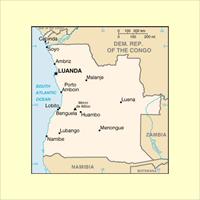Angola Bad Choice to Host World Habitat Day

The choice of the Angolan capital Luanda to lead the global observance of this year's World Habitat Day provoked controversy among housing and human rights organizations.
In a joint letter to the Executive Director of The United Nations Human Settlements Programme UN-HABITAT, who organized the event, Amnesty International, the Centre on Housing Rights and Evictions, the Habitat International Coalition and Human Rights Watch have all voiced their concerns about the choice of venue.
The Angolan government has carried out repeated mass forced evictions of its people to facilitate urban development projects and the construction of luxury housing, leaving tens of thousands living in poverty.
Other human rights violations committed in the course of these forced evictions include arbitrary arrests and detentions, torture and ill-treatment and harassment of human rights defenders.
World Habitat Day is organized by the United Nations (UN) to raise awareness of the human right to adequate housing for all and to remind the world of its collective responsibility for the future of the human habitat.
Known popularly as World Housing and Land Rights Day, it has been held every year on the first Monday of October since 1986. Last year, the main celebrations were held in The Hague. In previous years, they have been hosted by Naples, Jakarta, Nairobi and Dubai.
The Global Observance in Angola will take place at the Talatona International Conference Centre, attended by local and international participants from all sectors including governments, municipalities, parliamentarians and the private sector. Amnesty International has expressed concern however, at reports indicating that civil society has been excluded from the UN Habitat ceremony. Events will also be held all over the world.
The theme of the day this year is Harmonious Cities – "where everyone and every culture is at home." The UN chose the theme to "raise awareness about the problems of rapid urbanization, its impact on the environment, the growth of slums, and the urbanisation of poverty as more and more people teem into towns and cities looking for a better life.
"In an age where for the first time half of humanity is now living in towns and cities, the quest for adequate shelter for all along with basic services such as water, sanitation, electricity, decent health care, safe streets, etc., is more urgent than ever, especially in developing countries," according to a statement on the UN-HABITAT website.
"There should also be no illusion that cities have the greatest impact on the environment and climate change. And where they are poorly managed, with weak governance structures, it is their citizens and their surrounds that suffer most."
Luanda was chosen to lead this year's celebrations because it was hoped that this would "show the world how the country, after years of conflict, is progressing in the establishment of harmonious cities through improvements in urban infrastructure and services, and a new urban development strategy."
Amnesty International and the other organizations who sent the letter "recognize the efforts of some members of Angola's government to promote more open participation and decentralized governance, as well as steps to promote the recognition of the right to adequate housing through the enactment of land and housing laws and a housing project to provide social housing for youths in the country. However, such good practices do not seem to have taken hold, nor do they seem to enjoy sufficient support among Angola’s policy makers."
The letter continues "unless and until the government of Angola takes these requisite steps to address the widely reported violations of the right to adequate housing and other human rights in the context of widespread forced evictions, it is inappropriate to raise Angola as an example and focus of World Habitat Day/World Housing and Land Rights Day. By so doing, both the government of Angola and UN-Habitat add insult to the injury committed against Angola’s thousands affected by forced evictions."
The organizations have called on UN-Habitat to use the occasion of World Habitat Day in Luanda to urge the government of Angola to comply with its obligations under international law, take prompt, effective steps to stop and prevent forced evictions.
 Back and Next - Back and Next
Back and Next - Back and Next See Also - See Also
See Also - See Also